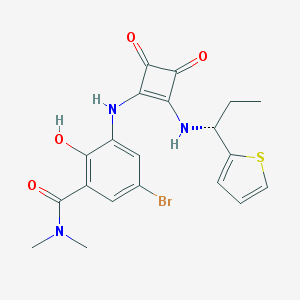

You can:
| Name | CHEMBL562950 |
|---|---|
| Molecular formula | C20H20BrN3O4S |
| IUPAC name | 5-bromo-3-[[3,4-dioxo-2-[[(1R)-1-thiophen-2-ylpropyl]amino]cyclobuten-1-yl]amino]-2-hydroxy-N,N-dimethylbenzamide |
| Molecular weight | 478.361 |
| Hydrogen bond acceptor | 7 |
| Hydrogen bond donor | 3 |
| XlogP | 4.0 |
| Synonyms | BDBM50297743 SCHEMBL12262880 (R)-5-bromo-3-(3,4-dioxo-2-(1-(thiophen-2-yl)propylamino)cyclobut-1-enylamino)-2-hydroxy-N,N-dimethylbenzamide |
| Inchi Key | FKOXURHFSVXVQQ-GFCCVEGCSA-N |
| Inchi ID | InChI=1S/C20H20BrN3O4S/c1-4-12(14-6-5-7-29-14)22-15-16(19(27)18(15)26)23-13-9-10(21)8-11(17(13)25)20(28)24(2)3/h5-9,12,22-23,25H,4H2,1-3H3/t12-/m1/s1 |
| PubChem CID | 45272873 |
| ChEMBL | CHEMBL562950 |
| IUPHAR | N/A |
| BindingDB | 50297743 |
| DrugBank | N/A |
Structure |  |
| Lipinski's druglikeness | This ligand satisfies Lipinski's rule of five. |
You can:
| GLASS ID | Name | UniProt | Gene | Species | Length |
|---|---|---|---|---|---|
| 80699 | C-X-C chemokine receptor type 1 | P25024 | CXCR1 | Homo sapiens (Human) | 350 |
| 80698 | C-X-C chemokine receptor type 2 | P25025 | CXCR2 | Homo sapiens (Human) | 360 |
zhanglab![]() zhanggroup.org | +65-6601-1241 | Computing 1, 13 Computing Drive, Singapore 117417
zhanggroup.org | +65-6601-1241 | Computing 1, 13 Computing Drive, Singapore 117417